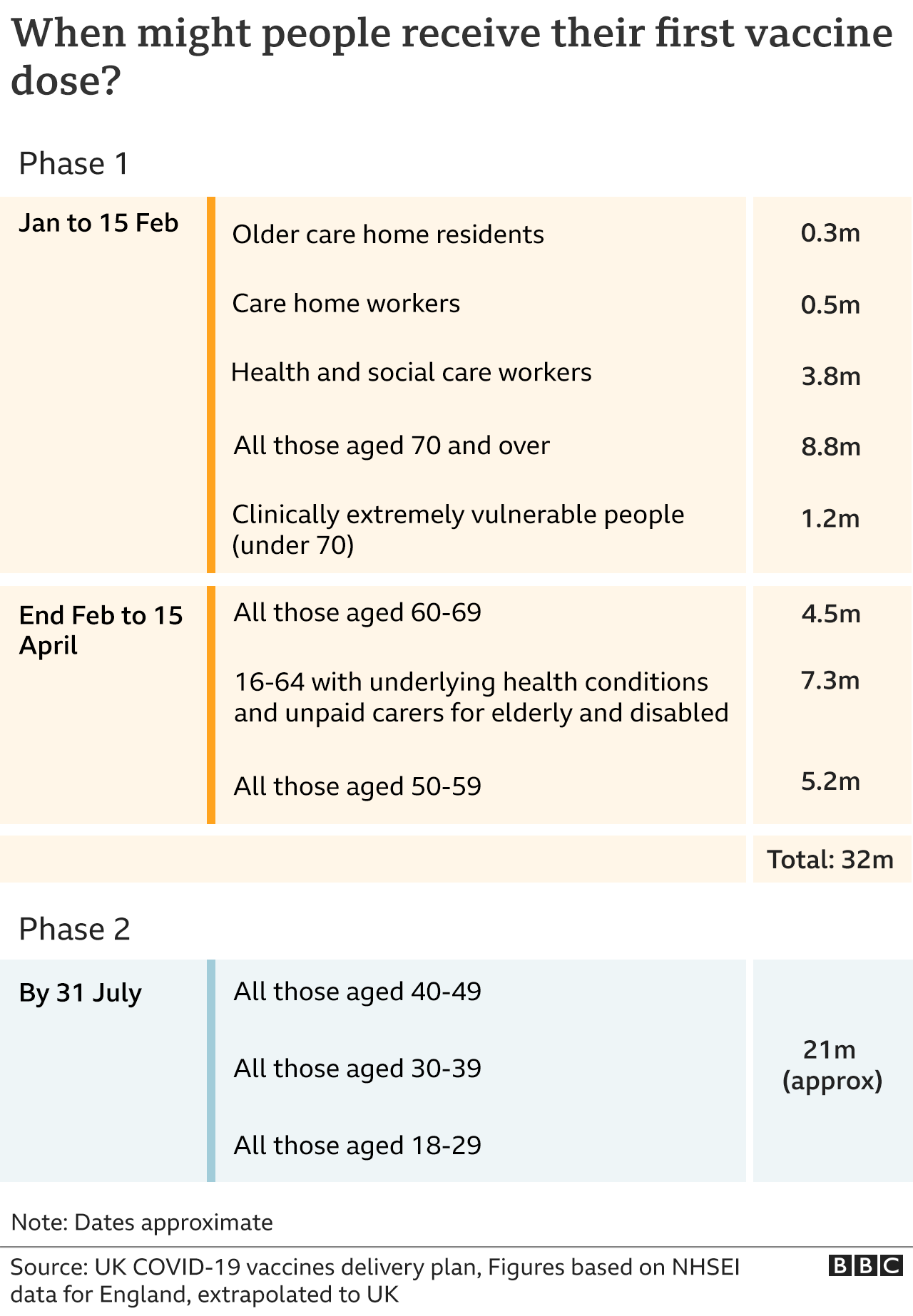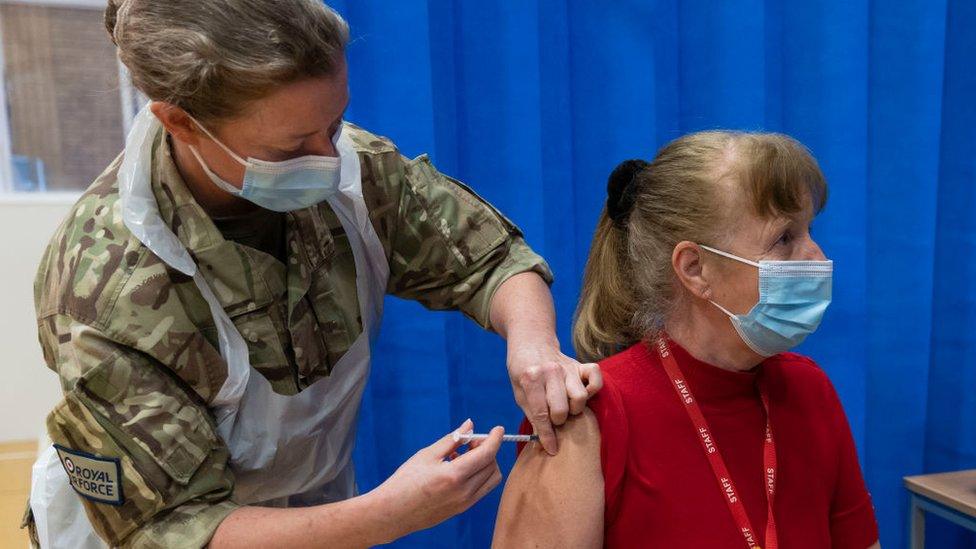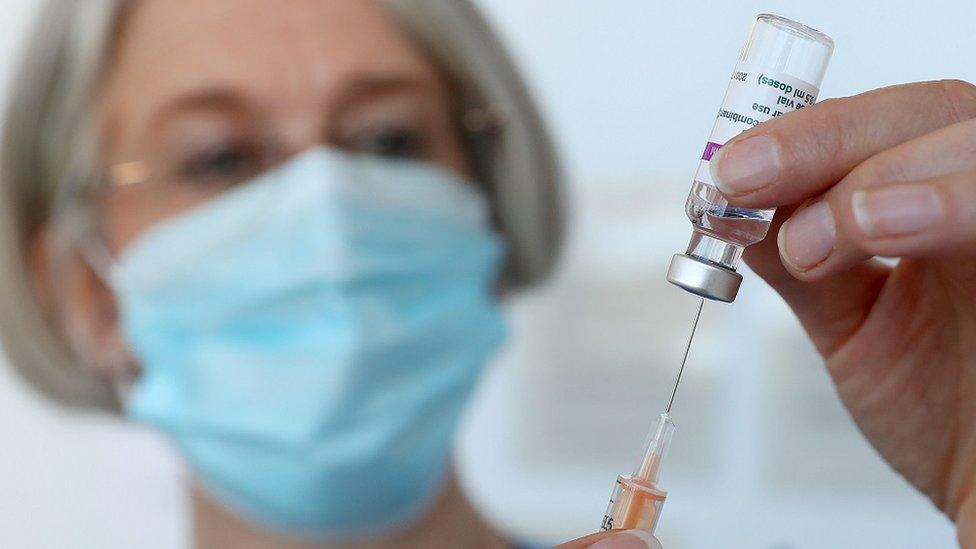Covid: Oxford-AstraZeneca vaccine safe, says Boris Johnson
- Published
Boris Johnson said England's roadmap out of lockdown will not be disrupted by vaccine supply issues
The Oxford-AstraZeneca vaccine is safe, Boris Johnson has said, adding he will be receiving it himself on Friday.
The benefits of the vaccine preventing Covid far outweighed any risks, the prime minister said, as he urged people to take up the jab when offered.
It comes after UK and EU regulators said there was no evidence the Covid vaccine caused blood clots.
Mr Johnson also said delays to vaccine supply next month would not affect England's roadmap out of lockdown.
"The progress along the road to freedom remains unchecked," he told a Downing Street briefing, after NHS England warned vaccine supplies would be reduced in April.
Prof Chris Whitty, England's chief medical officer, told the briefing the Covid vaccines were "very effective" against what remained a "very dangerous disease for many people".
He added that there were "real issues that we always have to think about with all drugs", but they were "so much smaller than the benefits of getting the vaccine".
"The risk-benefit is really strongly in favour of getting vaccinated," he said.
Regulators have received a very small number of reports of an extremely rare form of blood clot occurring in the brain, prompting some European countries to pause rollout.
But earlier, the MHRA, external and the EMA, external said people can have confidence in the vaccine's benefits and should get immunised.
France and Italy have since announced that they will resume using the jab.


A phrase used repeatedly today is the risk-benefit ratio. But what does that mean?
The EU and UK regulators were unable to completely rule out the vaccine as a cause of rare blood clots that have been seen.
Because the clots are so rare, it is hard to tell if they are above the levels you would normally expect without vaccination.
But even if a link is proven - and there is no suggestion it will be - the benefits of vaccination far outweigh the risks.
There have been 18 cases of this rare blood clot out of 20 million vaccinations in Europe. That's about one in a million.
Someone who is over the age of 75 and becomes infected with Covid has a one in nine chance of dying.
Even in younger age groups the benefits are clear. Someone in their 40s has a one in 1,000 risk of dying.
The vaccines have been proved to be highly effective. They will save lives, rather than cost them.

Also during the briefing, Mr Johnson confirmed that supplies of the AstraZeneca vaccine had been affected by a delayed shipment from the Serum Institute of India.
After opening up appointments to all over-50s on Wednesday, the NHS in England was then told not to offer jabs to younger age groups throughout April.
"There is a delay as I have described, as there are very frequently in vaccine rollout programmes," he said.
He put it down to "various technical reasons" and said the Indian government "hasn't stopped any export".
The Serum Institute of India is the world's largest manufacturer of vaccines and is making one billion doses of the AstraZeneca jab this year for low and middle-income countries.
Earlier this month, it agreed to supply 10 million doses for the UK, but only half of these will arrive this month with the rest held up by four weeks.
The Serum Institute said: "Five million doses had been delivered a few weeks ago to the UK and we will try to supply more later, based on the current situation and the requirement for the government immunisation programme in India."
Its chief executive, Adar Poonawalla, has previously called for patience over global vaccine deliveries, saying the company has been "directed to prioritise the huge needs of India"., external
He has also raised concerns about raw material shortages, attributing this to US export bans on specific items needed to make vaccines,, external such as specialised bags and filters.


LOCKDOWN LIFTING: Four back to school worries and how to ease them
THE SCIENCE OF SIDE EFFECTS: James Gallagher reflects on his personal experience of having the vaccine as well as diving into the science behind them

Related topics
- Published18 March 2021

- Published17 March 2021
